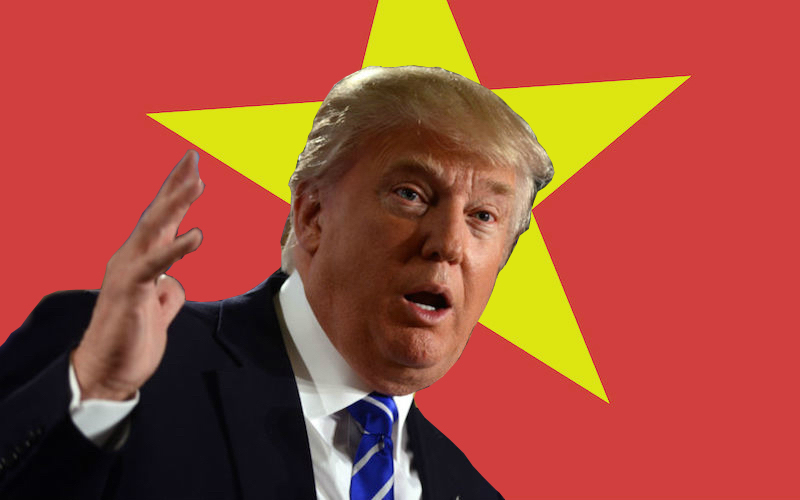
Trump’s Triumph and What it Means for Vietnam
Trump’s victory might have surprised and in some cases concerned many oversea observers, especially in many Southeast Asian countries like Vietnam where Obama’s “pivot to Asia” has been encouraged. Will the Trump administration maintain its commitment to the region given Trump’s promise to focus more on domestic issues and his expressed distaste for the TPP? Will there be less favorable policies that would effect Vietnam in the South China Sea considering Trump’s unpredictable nature and his lack of experience in diplomacy and strategic planning?
Looking beyond TPP
Trump might have pulled back his previous remarks made about climate change after his victory but he remains consistent on TPP, stating that it would be terminated the first day he is in office, which suggests the fate of the deal. That scenario is viewed with pessimism in countries like Vietnam, especially when Vietnam is trying to promote integration and domestic reforms and reduce its economic dependence on China.
However, it is also worth noticing that other major economies are already pushing efforts to continue TPP, notably Japan and Singapore. There is still a future of a TPP without the US because of the high-level standards TPP would establish for trade in Asia. Other venues like RCEP might be available but are not as promising for Asian countries, especially those who are in dispute with China over its maritime claims. Another possibility to consider is that the US might rethink TPP. After all Trump’s running mate, Mike Pence, used to back TPP as governor.
Moreover, protectionist as he seems, Trump has claimed that he is still pro-trade, but will focus on country-by-country trade agreements instead. China’s market suggests less optimism from American businesses (Uber had to sell its business to local rival Didi, for example). Southeast Asian countries with political instability, are inclined to favor China, therefore, Vietnam will continue to be in the spotlight as one of the promising destinations for US’s economic ventures.
In 2017, Vietnam will receive a great deal of attention from major economies as a result of APEC and Trump will have to turn his attention towards Vietnam accordingly considering his business background and deal making nature, especially when US businesses are expected to flood to Vietnam early in order to seize the opportunity to influence the agenda.
South China Sea
Trump’s criticism regarding the US’s past military involvement overseas and the desire to bring down IS and tackle the Syrian crisis suggests that the security in the South China Sea will receive less attention from the new administration and a diminished presence might not benefit countries in dispute with China like Vietnam.
However, Trump has also vowed to expand the military and increase the navy which could benefit military bases in Japan and Philippines either through military exercises with allies and partners or frequent FONOPs. Moreover, his criticism of China (shown clearly on trade issue) and his tendency to react strongly might predict a tougher future stance of the US in dealing with expansive China policies. Lastly, Japan, US’s closest ally in Asia, will try its best to keep Trump interested in the regional security landscape, especially the Senkaku conflict in the East China Sea (Abe is the first foreign leader to initiate direct talks with Trump after the election), which might help restrain unilateral attempts in the South China Sea as well. For Vietnam, those signs are favorable to its balancing between big powers’ policies.
Extra factors to consider
One of the four most promising candidates for the Secretary of State in Trump’s administration is Senator Bob Corker. Similarly to Jon McCain, Corker is believed to uphold a pro-Vietnam viewpoint, as can be seen from his visit to Vietnam during the oil-rig incident with China back in 2014 where he voiced his support for Vietnam’s effort to settle the dispute peacefully. In 2015, Corker also came out in favor of setting up a “free-trade zone” with Vietnam.
The Trump administration is unlikely to pay much attention to “human rights” issues in foreign countries which are considered to be obstacles in Vietnam – US relations. Those people who helped elect Trump are not the demographic group interested in activists oversea and would like Trump to invest in domestic policies and economic problems instead. Therefore, a scenario where less diplomatic pressure is put on bilateral relations between Vietnam and the US is probable.
While uncertainties do exist about Trump’s policy towards Asia and Vietnam, especially when his picks for Defense Secretary, NSA and Deputy NSA positions do not seem to have much experience in Asia and are described as slightly “extremist,” there is still hope for Asian countries like Vietnam to stay positive, to maneuver and to convince Trump of the importance of Asia and forge a better bilateral tie. After all, American interests, or any nation’s interests, will not be changed easily overnight just because of a new rising political figure.
